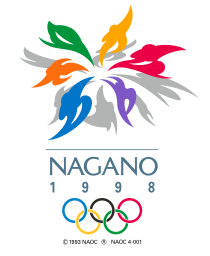1998 Winter Olympic

The emblem represents a flower, with each petal representing an athlete practicing a different winter sport. It can also be seen as a snowflake, thus the name "Snowflower" was given to it.
|
|||
| Host city | Nagano, Japan | ||
|---|---|---|---|
| Motto | Coexistence with Nature (Japanese: 自然との共存, Shizen to no Kyōzon) | ||
| Nations participating | 72 | ||
| Athletes participating | 2,176 (1,389 men, 787 women) | ||
| Events | 68 in 7 sports (14 disciplines) | ||
| Opening ceremony | 7 February | ||
| Closing ceremony | 22 February | ||
| Officially opened by | Emperor Akihito | ||
| Athlete's Oath | Kenji Ogiwara | ||
| Judge's Oath | Junko Hiramatsu | ||
| Olympic Torch | Midori Ito | ||
| Stadium | Olympic Stadium | ||
| Winter | |||
|
|||
| Summer | |||
|
|||
The 1998 Winter Olympics, officially the XVIII Olympic Winter Games (French: Les XVIIIes Jeux olympiques d'hiver)(Japanese: 第十八回オリンピック冬季競技大会 Dai Jūhachi-kai Orinpikku Tōkikyōgi Taikai), and commonly known as Nagano 1998, was a winter multi-sport event celebrated from 7 to 22 February 1998 in Nagano, Japan.
72 nations and 2,176 participants contested in 7 sports and 68 events at 15 venues. The Games saw the introduction of women's ice hockey, curling and snowboarding. National Hockey League players were allowed to participate in the men's ice hockey.
The host was selected on June 15, 1991, over Salt Lake City, Östersund, Jaca and Aosta. They were the third Olympic Games and second Winter Olympics to be held in Japan, after the 1964 Summer Olympics in Tokyo and the 1972 Winter Olympics in Sapporo. Nagano is so far the southernmost city to host a Winter Olympics, next to Squaw Valley, host of the 1960 Winter Olympics. The games were succeeded by the 1998 Winter Paralympics from 5 to 14 March. These were the final Winter Olympic Games under the IOC Presidency of Juan Antonio Samaranch.
...
Wikipedia
